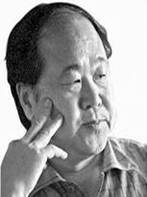题目内容
He read more carefully than I ________.
- A.do
- B.did
- C.am
- D.was


Mo was born into a farming family in a village in Shandong province .He grew up listening to folk stories about gods, spirits foxes .Those stories later became the inspiration (灵感)for Mo’s writing.
Mo left school at the age of 12 and started to work in the fields . Although he was tired after his daily hard work ,Mo was always hungry for books .However, there were very few in the village .He read his older brothers’ textbooks and even dictionaries .He helped others with farm work in exchange for books . “When I finished reading all the books around ,I thought I was the most knowledge man in the world ,”he told Xinhua.
After Mo left his hometown and joined the army in 1976,he began to read widely ,including works by Lu Xun and many other famous writers .He studied from these writers but did not copy them .Instead ,he developed his own style .As the first Chinese citizen(公民)to win a Nobel Prize in literature, Mo told a group of reporters in his hometown shortly after he won the award . “I grew up in an environment filled with folk culture .It enters my novels whenever I pick up a pen This has affected ,even decided my style.”
【小题1】When did Mo Yan leave school and start to work in the fields ?
| A.at the age of 12. | B.at the age of 11. |
| C.at the age of 13 | D.at the age of 15 |
| A.Shanxi | B.Jiangsu | C.Shandong | D.Guangdong |
| A.while listening to folk stories about gods ,spirits and foxes |
| B.during his dairy hard work in the fields. |
| C.when he won the Nobel Prize in literature. |
| D.after he studied from many famous writers. |
| A.Mo Yan left school when he was very young. |
| B.Mo Yan was the most knowledgeable man in the world. |
| C.Mo Yan read many books when he was very young. |
| D.Mo Yan is the first Chinese citizen to win a Nobel Prize in literature. |
| A.Rome was not built in a day. | B.Easier said than done. |
| C.Well begun , half done . | D.The older, the wiser. |
Mo, the first Nobel winner in literature born and living in China, said he had trouble with the sudden publicity, which put a lot of pressure on him.
"I only hope to return to my writing desk as soon as possible, and I would also like to do well in society anonymously.(无名地)" Mo said. He was bothered by a large number of requests asking him to offer help that took advantage of his fame. " I was upset the first several days after the prize announcement, but then I realized the prize is just like a mirror that reflects various attitudes about my winning, and more, reflects the real me," Mo said. "I still consider myself an ordinary citizen who writes. And presenting quality works is my duty and best way of giving back to society. I'm no superstar," he emphasized(强调) several times.
Mo believes Chinese literature has achieved much in the past thirty years, and the driving force behind that is not the prize. Writers' creations should not be driven by awards, or criticism, or readers' expectations. Mo said he misunderstood the standards of the academy's selection before he visited Stockholm(斯德哥尔摩) to receive the prize in December.
"I thought they were judging the authors' personality or political features, then I learned the sole standard of their selection is literature itself, which is also deeply based in the Swedish people's long-established practice of reading a large number of books," Mo said.
During the forum, established Chinese and Australian writers discussed subjects as diverse as tradition and modernity, the local and the universe and cultural inclusiveness. And they will also read works to each other and the readers. The writers communication will further promote(推动) Chinese writers to a global audience.
Australian Ambassador(大使) to China Frances Adamson agreed. "It's a milestone (驱动)of literary exchanges between the two countries, who are longtime friends," Adamson said.
【小题1】 Mo is the first Nobel winner in ______ born and living in China.
| A.literature. | B.peace | C.physics | D.chemistry |
| A.In September | B.In October | C.In November | D.In December |
| A.He considered he was a superstar. |
| B.He still considered he was an ordinary citizen who writes. |
| C.He considered he was famous all over the world. |
| D.He considered he became rich. |
| A.He is the French Ambassador to China | B.He is the Canadian Ambassador to China |
| C.He is the Australian Ambassador to China | D.He is the American Ambassador to China |
| A.Mo didn’t hope to return to my writing desk | B.Mo was always upset after the prize . |
| C.The driving force behind writers is the prize | D.Mo’s success will promote Chinese writers. |

